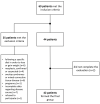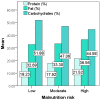Diet in Scleroderma: Is There a Need for Intervention?
- PMID: 34829464
- PMCID: PMC8620611
- DOI: 10.3390/diagnostics11112118
Diet in Scleroderma: Is There a Need for Intervention?
Abstract
Systemic sclerosis (SSc) patients exhibit a plethora of risk factors for nutritional decline, including the presence of chronic inflammation and the progressive nature of disease-related multisystem involvement. The prevalence and consequences of nutritional decline in scleroderma are frequently underestimated, its management currently remaining a subject of debate. The main objective of the present study was to perform a detailed assessment of scleroderma patients' diet as well as their eating habits and to describe the relationships with weight loss and malnutrition risk in the absence of professional nutritional counseling.
Methods: We used a translated and validated version of the EPIC-Norfolk FFQ (European Prospective Investigation into Cancer and Nutrition Norfolk Food Frequency Questionnaire) to evaluate the patients' diet and MUST (Malnutrition Universal Screening Tool) to investigate the risk of malnutrition. Disease activity was estimated using the EUSTAR-AI (European Scleroderma Trials and Research group Activity Index).
Results: We included 69 patients with SSc, of which 42 underwent a detailed dietary assessment. Dietary factors were connected to body composition and digestive symptoms. We found high sodium intake and frequent suboptimal energy consumption in our study group, including patients with cardiopulmonary involvement. Liver transaminases were inversely correlated with the consumption of nuts and seeds. Malnutrition and weight loss were significantly associated with pulmonary hypertension, heart failure, albumin levels, and the extent of skin fibrosis, but not advanced age. Although the patients with EUSTAR-AI ≥ 2.5 were more frequently included in the moderate and high malnutrition risk categories, these results did not reach statistical significance.
Conclusions: Currently, there is an unmet need for longitudinal and interventional research focusing on the long-term significance, ramifications, and management of nutritional impairment in SSc patients with various clinical manifestations. Our results indicate that scleroderma patients could benefit from personalized nutritional counseling in an interdisciplinary setting.
Keywords: diet; digestive symptoms; disease activity; malnutrition; nutrition; pulmonary hypertension; relative fat mass; sodium; systemic sclerosis; weight loss.
Conflict of interest statement
The authors declare no conflict of interest.
Figures
References
-
- Gullo A.L., Mandraffino G., Rodríguez-Carrio J., Scuruchi M., Sinicropi D., Postorino M., Morace C., Giuffrida C., Sciortino D., Gallizzi R., et al. Endocan and Circulating Progenitor Cells in Women with Systemic Sclerosis: Association with Inflammation and Pulmonary Hypertension. Biomedicines. 2021;9:533. doi: 10.3390/biomedicines9050533. - DOI - PMC - PubMed
LinkOut - more resources
Full Text Sources



